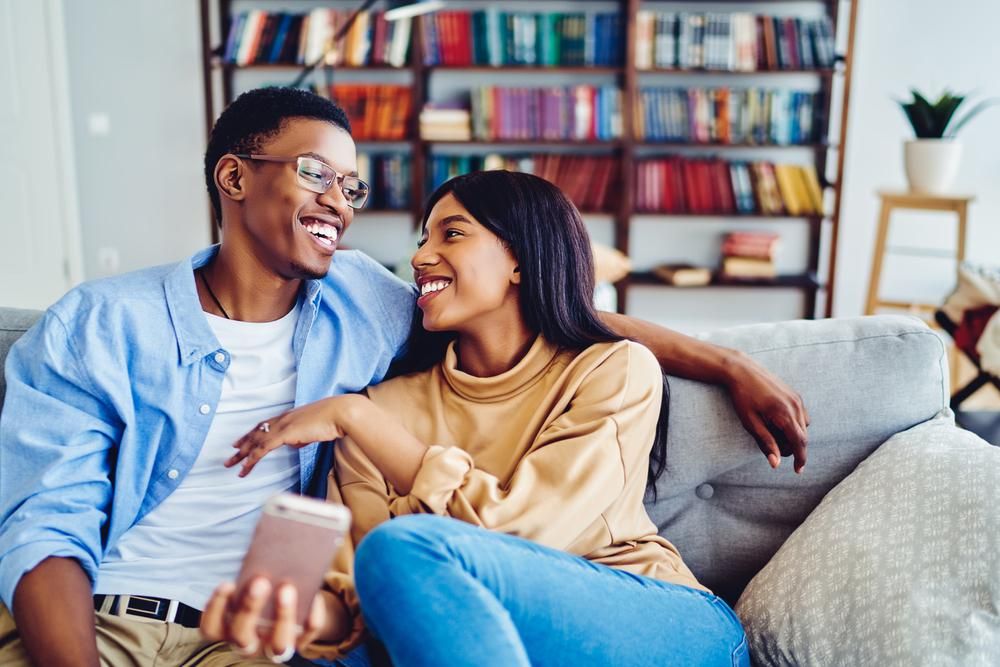Love & Relationships

Ad
If you're the least bit wise, one of the first things you've learned about life is this: not all things that glitter are gold. And, because that phrase is applicable to virtually anything, let me be specific. In this case, I mean, you're sitting (stuck even) in the house with your significant other in the midst of a pandemic and boom, you realize you don't know them as well as you might have thought sans lockdown. This could be for many reasons but in my expert opinion and observation, it comes to the over-pouring into one type of intimacy while not necessarily honing in on others (which absolutely matter).
While some couples ignore sexual compatibility, others are missing financial intimacy or the type of intimacy that is built on non-sexual communication. There are several types of intimacy and it's very rare that couples are well-versed in all of them—we're human, after all. Perhaps you're placing too much weight on sexual intimacy, which can definitely build intimacy but it's similar to when we're locking our thumbprint into our iPhone — it can only span over so much before you have to lift and replace your thumb on another area to ensure you've covered all your grounds.
But, what I'm here to tell you is that by improving your emotional connection and learning to build emotional intimacy in your relationship as a whole, there will be a trickle effect that occurs in the other areas of your relationship. (Might even unlock next-level sex). So I spoke with one of my faves, Shadeen Francis, licensed sex and relationship therapist, for her thoughts on improving emotional connection in our romantic partnerships.
She wasted no time expounding on the need for emotional connections in our partnership emphasizing the magnitude of knowing someone deeply. She shared, "Emotional connection is how we build intimacy. Intimacy is the deep knowing of one another, not just things about them, like that they don't like onions, but their actual experience in the world, such as it makes them anxious to travel alone. Rather than the belief that we are supposed to be able to predict or interpret one another's feelings, we learn about each other over time."
"Emotional connection is how we build intimacy. Rather than the belief that we are supposed to be able to predict or interpret one another's feelings, we learn about each other over time."

Many of us are under the impression that millennials have a disconnect when it comes dating, one that makes us insensitive to the opposite sex. Whether that's true or not, I won't confirm...at least not today but what I will say is that fixing the disconnect will require an entire generation to come together for community building that further explores the current dynamics of Black love. It seems that the more independent we grown — as we reform gender roles — we have lost our ability or incentive to be vulnerable, in my opinion. But according to Francis, vulnerability is a necessary climb but a difficult one for most of us. "Emotional connection requires emotional vulnerability, the regular sharing of emotions. That can feel really hard when we are feeling hurt or afraid. To tell someone 'I am feeling sad' or 'I am feeling scared' is to essentially give them a clear roadmap into your heart. We might not have had the permission, guidance, or the safety to do that in our families, friendships, or past relationships, but it is a necessary practice in relationships."
She continued, "A sign that [this] might be missing [is] if you notice yourself being unwilling to confide in one another, defensiveness, conflict avoidance, or consistently feeling misunderstood." Though, so much of the work does and will occur in your relationships directly. I must add that getting to the healthier version of what our grandparents had (that seems to always be the comparison) — a love that endures all but without so much of the hurt that they suffered due to unspoken trauma (generational and otherwise) — will require vulnerability on a larger scale in addition to doing the work in our individual relationships.
"To tell someone 'I am feeling sad' or 'I am feeling scared' is to essentially give them a clear roadmap into your heart. We might not have had the permission, guidance, or the safety to do that in our families, friendships, or past relationships, but it is a necessary practice in relationships."
Maybe you read this and know immediately that, when it comes to emotional intimacy, you and your boo are lacking. Or maybe you don't feel like that area doesn't need work at all. Either way I'd say there's always room for improvement. We're always evolving individually and in our relationships, thus there's always more intimacy to unpack — things to learn and unlearn — and when you think about it, that's the fun part about partnership. The ebbs and flows.
That said, Francis recommends asking these questions to improve the emotional connection and intimacy:
- How are you feeling? (Invite them to use an emotion word, like angry, surprised, sad - "aight", "good", "fine", and "some type of way" are not feelings!)
- What do you wish I knew about you?
- When you are feeling _____________, what can I do to help you feel better?
- What's a favorite memory we've shared so far? How can we create some of that feeling again?
She further suggests that you make it a game if it feels a bit odd or "challenging to initiate emotional conversation," adding that "there are a number of card decks and conversation cards that are designed to promote intimate conversation. Pick one that feels like a good fit and set aside some time, maybe over dinner or on a date night, to go through them. Or pull one card each day. Let your partner know it's not a test, you just want to get to know them better."
Additionally, you can check out Pinterest for more activities to help build emotional intimacy. Lastly, because I know society has a habit of asking Black men and women to stay "strong" all the same and yet differently, I inquired about how this intimacy homework and the questions provided might change based on gender...just to be on the safe side. But truly, Francis' response was the perfect f*ck you to the white supremacy that has especially left Black men feeling less than for participating in the human experience that is emotion.
"Society socializes men to disengage from their emotions, but having feelings isn't 'feminine.' Emotions have no gender. Everyone has emotions, they are necessary parts of our survival as they make it clear what we are experiencing."
Love seems sparkly and it definitely has its moments, but much like self-love, the real stuff lies in the ongoing buffering and polishing to ensure that it's not just good lighting reflecting off that jawn. Taking the time to reflect, both actively and retroactively, then initiating change through efforts such as this — well, that's how you truly get to live life in love and … golden (the sparkly stuff too).
Are you a member of our insiders squad? Join us in the xoTribe Members Community today!
Featured image by Shutterstock
Related Articles Around the Web
- 11 Questions To Ask Your Partner If You Want To Build A More ... ›
- 52 Questions to Bring You Closer Together - Lemonade Blog ›
- 10 Questions to Ask Your Spouse to Grow Your Emotional Connection ›
- 99 Questions to Strengthen the Emotional Intimacy of Your ... ›
- 36 Questions to Build Emotional Intimacy ›
- 40 Questions That Can Build Intimacy in a Relationship ›
ALSO ON XONECOLE


